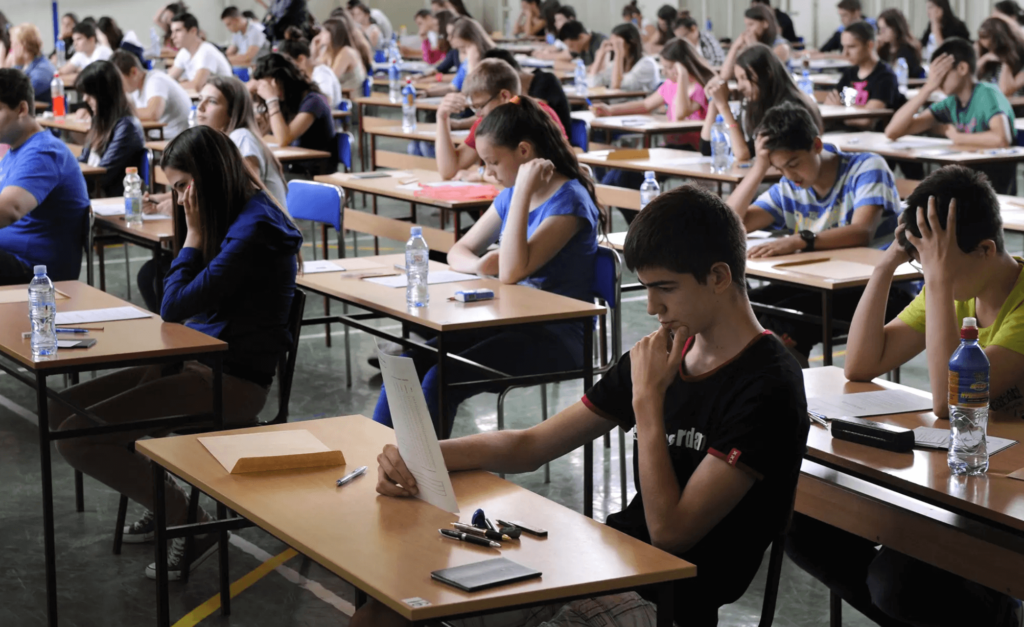Vivian Jiang ’27 | Karen Shi ’27 | Alice Wu ‘26
Through the competitive atmosphere of college admissions, the role of the SAT has fluctuated over the years. Recently made mandatory again at many top colleges, this change has invoked different impressions among high school students. While some are relieved at this adjustment for the chance of boosting their odds at acceptance, others see this as a potentially harmful shift adding to the already stressful process of applying for college. Until the decision about mandatory SATs comes to a rest, students should use their best judgment and weigh the costs/benefits of taking a standardized test or not.
Preparing for standardized tests requires time with tutors, courses, or copious amounts of practice tests. Aaron Zhu, ’25, states that his time taking a program over the summer as preparation for the SAT was well-spent, but he also remarks, “SATs are kind of pay to win, and taking that out of the equation makes it a lot easier for everyone to receive a good education.” Similarly, Danity Pike, ’27, expresses, “There’s a lot of factors that go into studying for the SATs, and that can be unfair to some students with fewer resources. Marginalized students have less access, and that makes it an unreliable assessment of your intelligence potential.” While the SATs are meant to provide a standardized test to regulate the fluctuation of GPA standards across the nation, the test itself is not an equal opportunity for all students like many other aspects of college admissions.

Photo courtesy of New York Post
Further, many students expressed the belief that the SATs should not represent a student as a learner or a person within admissions. Calvin Mackenzie, ’25, shares, “The SAT is somewhat accurate of a person’s ability to perform under pressure, but there tend to be outliers who score higher or lower than their typical academic abilities for a variety of factors.” He believes that the SAT should hold a similar value to the GPA, which represents a more accurate culmination of effort over time.
Danity agrees, emphasizing that the SAT only represents two subjects and does not signify intelligence within any interest classes. David Ding, ’25, also wishes there to be less pressure on scoring high, as he believes, “It doesn’t really say anything about your intelligence or mental capabilities. So I think, having it decide a big portion is kind of silly.” Instead, he suggests that the SAT should serve as a filtering system to condense the applications into a smaller pool. Conversely, Elizabeth Doyle, ’25, preferred that it be an add-on or an extra factor to further strengthen a resume. She makes the point, “You can be a bad test taker but still be a great learner. I think there’s more to it than just taking a test,” and she even hopes that advanced placement or college-level classes could be considered more thoroughly to act as better indicators of academic ability to college admissions.
Chrissy Cerenzia, Senior Associate Director of College Counseling, shares similar sentiments as students. She describes how the SATs are not a good representation of a student holistically. She states, “I believe in four years of work that you put into high school, I believe in the hours that you put into your classes and your studies and your assignments and feel that that’s a good accurate picture of who you’re going to be in the classroom…there’s just so much more to the student, and so much more benefit to the college to recognize that beyond just a score report that’s being sent to.” One test should not determine the hard work of a student over four years, and the mandatory SAT places it in a position to act as a culmination of academic efforts.
Furthermore, having a required SAT score could also be harmful to students. If students are unable to score in the typical range that is accepted for a particular college, this could hurt the student’s application if submission is mandatory. Cerenzia says, “If your SAT is in that threshold, and they’re required, then it could help your application. And if it’s below that threshold, then it could hurt your outcome.” There are a variety of reasons that contribute to a student’s SAT score that may be out of their control. Beyond monetary reasons, many students also lead busy lives, such as playing sports, where they do not have the opportunity to be able to dedicate time to test prep. She also notes, “Sometimes the prep doesn’t even work. You could have all the resources in the world, and the prep still might not work, which is hard.”
Ivie Enakhimion ’26 agrees, saying, “I do think that SATs should be optional because I don’t think they’re an accurate representation of a student’s knowledge, but I think there should be another way other than a GPA for colleges to get a sense of the student’s abilities…Luckily, there are still ways to get into good colleges without the SAT scores but not necessarily for certain majors like STEM ones usually.” She believes that the SATs should not be an important, deciding factor in college admissions because they do not serve as a good way to measure how strong a student is academically or how well they can do in college.
At the end of the day, the mandatory SAT perpetuates the idea that students should be considered on a scale rather than as people with passions and interests. Additionally, it places those without the resources to perform their best at an extreme disadvantage, creating yet another pay-to-win factor in college admissions. While the SAT provides great baseline statistics of general academic performance, it should not be able to define who we are as students, and more importantly as people.